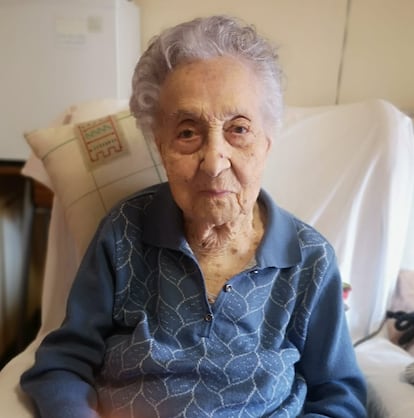The oldest person in the world is a 115-year-old woman from Spain
Maria Branyas, who lives in Olot, in the northeastern region of Catalonia, survived a Covid infection in 2020


“I’m old, very old, but I’m not an idiot”. This is the brief and forceful definition in the bio of Maria Branyas’ Twitter account (@Super Àvia Catalana). The 115-year-old on Tuesday became the oldest person on the planet, but very few people know how Branyas received the news at the the residence in Olot, in the northeastern Spanish region of Catalonia, where she has lived for more than two decades. EL PAÍS went to the care center, where facility managers said that neither the woman nor her relatives were going to make any statements. The director of the Santa Maria del Tura residence, Eva Carrera, said that Branyas is “in good health” and is “surprised and grateful for the expectation that the event has generated.”
Some of the center’s workers told EL PAÍS that Branyas has been the center of attention at the facility for several years. “She moves around in a wheelchair that has to be pushed and she barely speaks. She is very old,” said one of the employees. There is one member of the family who has expressed joy in public, her great-grandson, Albert Raventós, who tweeted: “I just came to say that my great-grandmother is now the oldest person in the world... heavy.”
On January 5, the Guinness World Records gerontology research group updated the list of the world’s most long-lived people. In first place was 118-year-old French nun Lucile Randon and in second place was Branyas. On Tuesday, after a life of 118 years and 340 days, Randon passed away, which automatically made Branyas the oldest living person at 115 years and 320 days.
This is not the first time that Branyas has been in the news. In May 2020, at the age of 113, she was already the longest-living woman in Spain, but she also became the oldest person to overcome a Covid infection. On March 4 of that year, she celebrated her birthday with family members and caught the virus, but managed to defeat it. Those days are well remembered by pharmacist Benjamín Sánchez. “My pharmacy did tests at several residences and among them was the center where Branyas is living. Those were days of madness and it was very surprising that a 113-year-old woman was able to overcome a disease that killed thousands of people,” he said in a telephone conversation with EL PAÍS.
The head of Dalt Pharmacy gathered a lot of information from these senior care centers and created a research project with the Spanish National Research Council (CSIC) and the Autonomous University of Barcelona (UAB). The project is still underway and aims to investigate why Covid had a greater impact on these facilities. “We named the initiative the Branyas project because she is now the oldest woman in the world to have survived Covid. We talked to her family and they agreed. It is also true that they don’t want to expose her to the media because she is very old and could catch Covid or the flu again... and at that age it could be fatal,” reveals Sánchez.
Maria Branyas was born on March 4, 1907 in San Francisco, in the US. Her father was a journalist from Pamplona who crossed the Atlantic in search of a better life and became editor of the American magazine Mercurio. While still a child, Branyas returned with her family to Spain during the First World War. She has survived two world wars, a civil war in Spain, the Franco regime and the Covid pandemic. She has lived in Barcelona, Girona and the smaller Catalan towns of Banyoles, Calonge i Sant Antoni and Palol de Revardit.
After Branyas, the second oldest person in the world is Japan’s Fusa Tatsumi, who was born almost two months later. The American Edie Ceccarelli is one year younger.
Sign up for our weekly newsletter to get more English-language news coverage from EL PAÍS USA Edition
Tu suscripción se está usando en otro dispositivo
¿Quieres añadir otro usuario a tu suscripción?
Si continúas leyendo en este dispositivo, no se podrá leer en el otro.
FlechaTu suscripción se está usando en otro dispositivo y solo puedes acceder a EL PAÍS desde un dispositivo a la vez.
Si quieres compartir tu cuenta, cambia tu suscripción a la modalidad Premium, así podrás añadir otro usuario. Cada uno accederá con su propia cuenta de email, lo que os permitirá personalizar vuestra experiencia en EL PAÍS.
¿Tienes una suscripción de empresa? Accede aquí para contratar más cuentas.
En el caso de no saber quién está usando tu cuenta, te recomendamos cambiar tu contraseña aquí.
Si decides continuar compartiendo tu cuenta, este mensaje se mostrará en tu dispositivo y en el de la otra persona que está usando tu cuenta de forma indefinida, afectando a tu experiencia de lectura. Puedes consultar aquí los términos y condiciones de la suscripción digital.








































